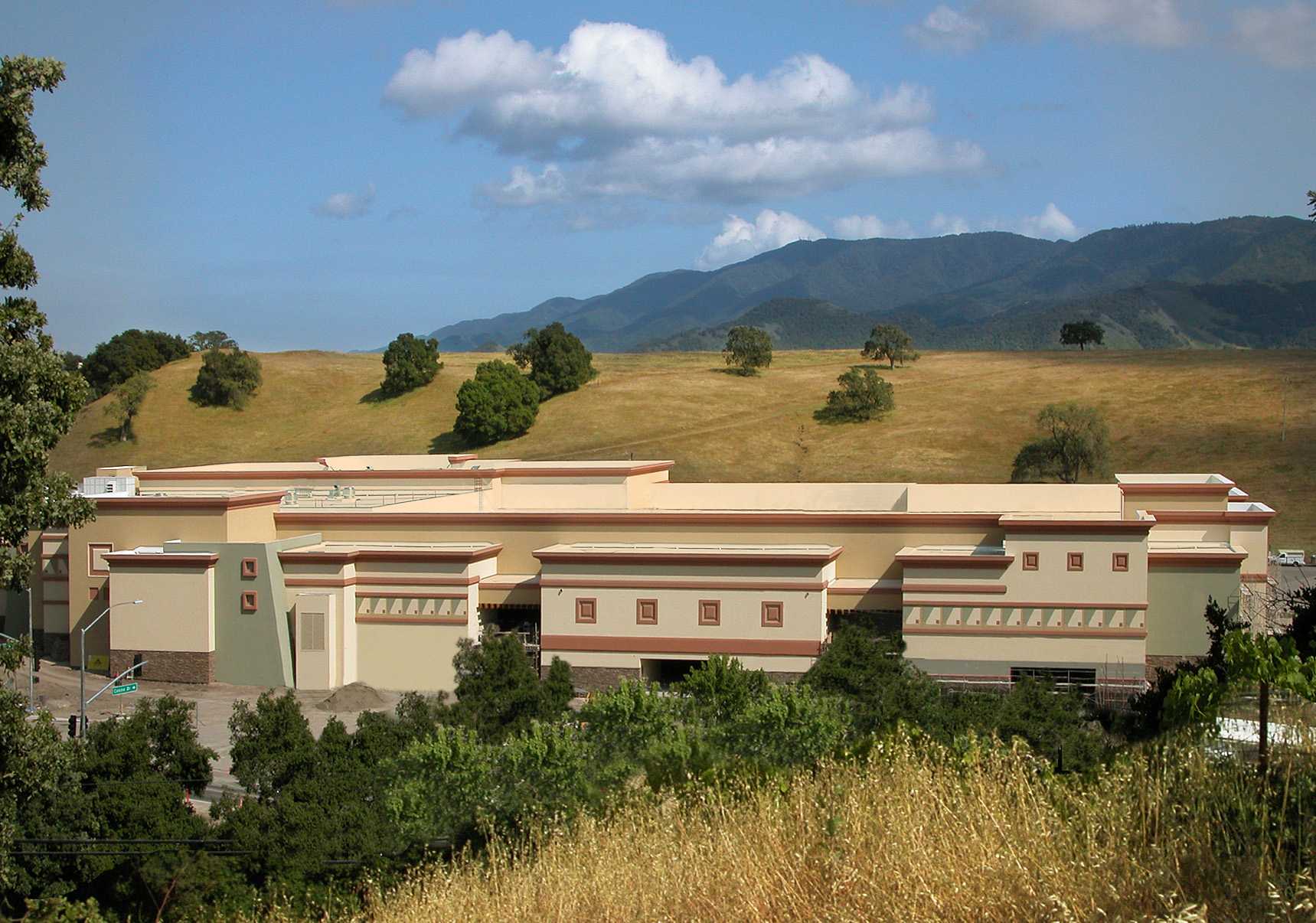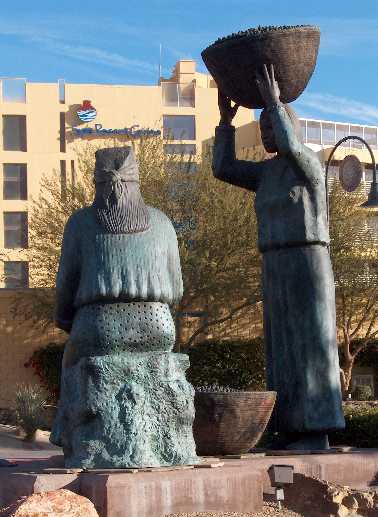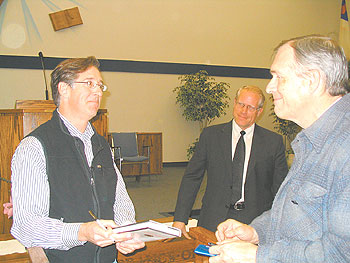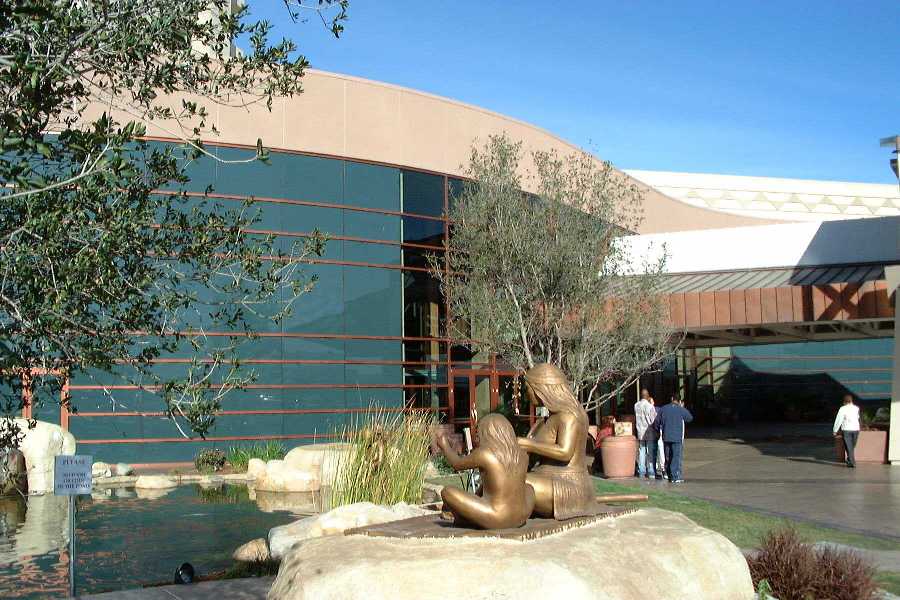 Another Stereotype of the Month entry:
Another Stereotype of the Month entry:
 Another Stereotype of the Month entry:
Another Stereotype of the Month entry:
From the Providence Journal:
Brett Duval Fromson: 'Hellish landscape of losers'
01:00 AM EDT on Tuesday, May 11, 2004
NEW YORK
"[Gambling] involves simply sterile transfers of money or goods between individuals, creating no new money or goods. Although it creates no output, gambling does nevertheless absorb time and resources. When pursued beyond the limits of recreation, where the main purpose after all is to 'kill' time, gambling subtracts from the national income."
— Nobel Laureate Paul Samuelson, in Economics (1970)
I READ this analysis of the economics of gambling by the great Massachusetts Institute of Technology professor when I was an economics major, back in the 1970s. Today, I believe more than ever that Samuelson was right on the money. Rhode Islanders considering granting a billion-dollar casino monopoly to the Las Vegas-based Harrah's Entertainment Inc. and its local business partner, the Narragansett Indian Tribe, would be wise to keep Professor Samuelson in mind.
Such a casino would be nothing less than a multibillion-dollar transfer of money from you and your neighbors to Harrah's and the Narragansetts.
I spent nearly 20 years reporting on business and finance for Fortune magazine, The Washington Post and other national news organizations. More recently, I spent a good three years padding around casinos and casino tribes, reporting for my book Hitting the Jackpot: The Inside Story of the Richest Indian Tribe in History — on the re-invention of the Mashantucket Pequots, of Connecticut, and the creation of their Foxwoods Casino.
I have concluded that the casino business has much in common with the tobacco business. Both profit by exploiting people's inability to limit consumption of the product. Like tobacco companies, casinos cynically make their biggest profits off the poor souls who cannot stop once they start. From 25 to 50 percent of a casino's profits can come from fleecing people who can't control their gambling. Casinos are fundamentally predatory.
Indian casinos employ a diabolically effective business model. They fix the odds at the slot machines so that on average for every dollar a customer bets, he or she gets back about 85 cents. It is, of course, highly profitable to take in $1 bills and give people 85 cents back day-in, day-out. (The phrase that comes to mind is "Heads I win; tails you lose.")
A slot machine can be bought and installed for $5,000, an investment often recouped within six months, courtesy of rigging the odds against the customers. I know of no other legal enterprise in the United States — except the cigarette business — that can boast of such a profit margin.
Casinos market themselves to the public in a fundamentally false manner. Television, radio and billboard advertisements emphasize easy money to be won and fun to be had — "the wonder of it all." These ads are much like the cigarette ads of the 1950s and '60s, which emphasized the fun of smoking, without mentioning the health risks.
The truth is that gambling is far grubbier. As Foxwoods executives and Pequot tribal leaders have admitted to me in interviews, the more you visit a casino, the longer you stay, the more you lose. Anyone seeking the reality of an Indian casino should visit Foxwoods at 2 a.m. on a weeknight to witness the smoke-flled hellish landscape of losers unable to tear themselves from the flashing, whirring slot machines, which eat their money while spouses, girlfriends or children slump nearby half asleep on chairs, benches or the floor. Or watch the elderly people throwing their savings away.
On the regional level, these casinos have pronounced negative economic consequences. They are giant vacuum cleaners, sucking disposable income from wage earners within a 100- to 200-mile radius.
Casinos such as the one proposed by Harrah's and the Narragansetts draw mainly on the nearby population for business. They are not "destination resorts," like Las Vegas, where the local economy can thrive because the bulk of the income transfer is from outsiders. Instead, they transfer income from the millions of middle- and working-class families living within driving distance to a tiny number of Indians and their out-of-state or overseas financial backers.

In essence, these Indian casinos are hidden regressive tax hikes on the non-Indians living nearby. The tax is regressive in that lower-income people tend to frequent casinos more than upper-income people, and therefore tend to have more of their incomes taxed by the casinos. The tax is hidden in that most people do not understand the taxing effects of these casinos — and the tribes and their backers do everything they can to squelch honest public debate of the issue.
Meanwhile, the casino tribes' hired guns from Las Vegas and Atlantic City rig the odds to ensure that their profits far exceed any revenue sharing with state government or campaign contributions to buy politicians' silence. That is why despite the $400 million or so annual kickback paid by the Pequots and the Mohegans to the State of Connecticut, far more money goes out of the state, via the losses incurred by the citizens of Connecticut. On combined annual revenues of about $2.5 billion, the two Indian casinos are pickpocketing far more than $400 million from local people.
Whatever Harrah's and the Narragansetts are telling you about payments to Rhode Island, you can be sure that the money will be far less than the profits they will be siphoning off from your household account.
Nor would the proposed casino be good for local business. It would shift discretionary consumer spending in the region away from other enterprises: Money lost at the slot machines is unavailable for movies, dinner, a seaside motel. Casinos are designed to lure people to the casino and keep them there to gamble, eat, drink and shop until they have emptied their wallets. After that, many cannot afford to visit local tourist attractions.
For example, attendance at Mystic Seaport has suffered since the establishment of the Foxwoods and Mohegan Sun casinos. When I asked a Mystic manager who had recently left why this was so, she said, "People now just go straight to the casinos."
To see the destructive effects of these potential shifts in discretionary spending, look at poor old Atlantic City. In the 1970s, when casinos first came to this New Jersey seaside resort, gambling was held out as its economic savior. Today, Atlantic City has a dozen casinos, and its business center has been hollowed out; within a few years of the arrival of the casinos, a quarter of all the small enterprises had closed. Casinos cannibalize local business.
Perhaps the most pernicious economic cost associated with casinos such as the one proposed for Rhode Island is that they produce tens of thousands of problem gamblers. Independent study after independent study has shown that the poor souls addicted to gambling saddle local economies with huge additional economic burdens.
For example, a 2004 study by researchers at Mansfield University, in Pennsylvania, found that the proposed introduction of slot machines could generate $247 million for the government — but would also create 75,000 "pathological gamblers," costing the state more than $750 million a year.
The very real economic costs borne by both businesses and consumers include: increased personal bankruptcies, fraud, embezzlement and robberies. This does not even account for the rise in burglary, larceny/theft, vandalism, drunken driving and weapons offenses associated with the arrival of a casino. And let's not forget that pathological gamblers report high rates of divorce, domestic violence, drug and alcohol addiction, depression and suicide attempts.
The high-powered lobbyists and public-relations people hired by Harrah's and the Narragansetts probably don't mention all these costs. Most likely, they instead tout the jobs that they say the casino will bring.
Let's talk about those jobs. First, many will be construction jobs, ending as soon as the casino is built. Second, many will not be filled by Rhode Islanders, because they will go to people with more casino experience. Third, if Connecticut's experience is any guide, many of the jobs will be low-skill, low-wage (less than $20,000 a year); despite the advent of the casinos, wage levels in eastern Connecticut have remained below the state average.
Casinos do not pay above-market wages for people to clean the bathrooms, park the cars, or deal the cards. A recent study commissioned by the Montana Legislative Council found that the average casino worker earned $9,600 a year, excluding tips and benefits. Even adjusting for the higher wage level of New England, these are not high-paying jobs.
It is little wonder that Foxwoods has taken to recruiting workers from outside its area. Workers are not stupid. They prefer higher-paying jobs with better career prospects and more pleasant working conditions than in a casino — where customers who have lost money can be cranky indeed.
In short, the proposed Rhode Island casino would be what economists call a "zero-sum game": Their profits are your losses. The proposed casino referendum should come with the following public-health warning: "Casinos Are Hazardous to Your Economic Health."
Whom are you going to believe: Nobel laureate Paul Samuelson or the hired guns of the Narragansetts? I urge Rhode Islanders to follow the sensible example of your fellow New Englanders in Maine, who last year defeated a similar Las Vegas-inspired casino campaign.
Brett Duval Fromson is a former Washington Post and Fortune magazine editor and the author of Hitting the Jackpot: The Inside Story of the Richest Indian Tribe in History (Atlantic Monthly Press, 2003).

Rob's reply
>> I READ this analysis of the economics of gambling by the great Massachusetts Institute of Technology professor when I was an economics major, back in the 1970s. <<
You could say that about any entertainment business. Considering how successful the entertainment and gambling industries both are, it's not exactly a persuasive argument.
>> Such a casino would be nothing less than a multibillion-dollar transfer of money from you and your neighbors to Harrah's and the Narragansetts. <<
And movies transfer money from your pockets to that of the studios and theater owners. How is this different from any entertainment business, or any business, period?
>> I have concluded that the casino business has much in common with the tobacco business. Both profit by exploiting people's inability to limit consumption of the product. <<
Again, you could say that about many if not all entertainment industry. How about the video game industry, for instance?
What about other pastimes? Eating? Working out? Playing the stock market? Clearly, you can overindulge in any form of consumption. That's not to downplay gambling problems, but the "inability to limit consumption" isn't limited to gambling.
>> Indian casinos employ a diabolically effective business model. They fix the odds at the slot machines so that on average for every dollar a customer bets, he or she gets back about 85 cents. <<
First, why limit this statement to Indian casinos? Every casino with slot machines "fixes the odds" (i.e., sets a payout rate).
Second, why is the practice "diabolical"? Fromson is edging close to the age-old stereotype that Indians are unholy heathens: children of the Devil.
Third, Indian casinos don't have to disclose their slot-machine payout rates, so where does Fromson get his figure from? And what makes him think it's worse than the payout at non-Indian casinos? Who knows?
>> I know of no other legal enterprise in the United States — except the cigarette business — that can boast of such a profit margin. <<
I gather Fromson is talking about the "profit margin" of slot machines. If so, his statement is incorrect. Fifteen percent is a common profit margin among businesses. A profit margin of 30% or 40% is exceptional, while a 5% or 10% margin is subpar. Fifteen percent is somewhere in the broad middle.
>> Casinos market themselves to the public in a fundamentally false manner. <<
Notice how Fromson switches from "Indian casinos" to "casinos" in the midst of his criticism. This is a subtle attempt to attribute all the problems of gambling to Indian casinos whether they apply or not. Watch for it.
>> As Foxwoods executives and Pequot tribal leaders have admitted to me in interviews, the more you visit a casino, the longer you stay, the more you lose. <<
Well, duh. Tell us something we don't know.
>> On the regional level, these casinos have pronounced negative economic consequences. <<
Where's the evidence for this claim? From what I've seen and heard, it doesn't exist. Most studies show mixed to positive economic consequences. Most communities speak positively of nearby Indian casinos once they're in business.
>> Casinos such as the one proposed by Harrah's and the Narragansetts draw mainly on the nearby population for business. They are not "destination resorts," like Las Vegas, where the local economy can thrive because the bulk of the income transfer is from outsiders. <<
I'm not sure it matters where a casino's customers come from. Wherever they're from, they're "transferring" their income from their homes and communities to the casinos.

>> Instead, they transfer income from the millions of middle- and working-class families living within driving distance to a tiny number of Indians and their out-of-state or overseas financial backers. <<
How tiny is "tiny"? Some gaming tribes have thousands, even tens of thousands, of members. By law, the majority of the income goes to the tribes, not the backers. And why does the location of the backers matter? If the companies with gaming expertise are located in Las Vegas or Atlantic City and the tribes aren't, of course the backers are going to come from out-of-state.
>> In essence, these Indian casinos are hidden regressive tax hikes on the non-Indians living nearby. <<
You could call every form of gambling a "regressive tax"—including racetracks and state lotteries. Is Fromson campaigning against all of these on economic grounds? Or is he singling out Indian gaming? If so, why?
>> The tax is hidden in that most people do not understand the taxing effects of these casinos — and the tribes and their backers do everything they can to squelch honest public debate of the issue. <<
They do? Where's the evidence of that? Why is it that gaming tribes contribute more to problem-gambling programs than non-Indian casinos, if they're trying to squelch the truth?
>> Let's talk about those jobs. First, many will be construction jobs, ending as soon as the casino is built. <<
Ending as soon as that phase of casino construction ends, he means. And resuming once more casino construction commences.
>> Second, many will not be filled by Rhode Islanders, because they will go to people with more casino experience. <<
So? If Fromson want to talk about negative "regional" effects, he should talk about positive regional effects, such as employment in the entire region.
>> Third, if Connecticut's experience is any guide, many of the jobs will be low-skill, low-wage (less than $20,000 a year) <<
Again, so? Is that any worse than other jobs in the restaurant or hotel business, which is analogous to the casino resort business?
>> despite the advent of the casinos, wage levels in eastern Connecticut have remained below the state average. <<
Which tells us exactly nothing. Maybe the average wage level would've been even lower without Connecticut's two Indian casinos.
>> Casinos do not pay above-market wages for people to clean the bathrooms, park the cars, or deal the cards. <<
Apparently they don't pay below-market wages, or Fromson would say so. So we have a business that pays market wages...oh, what a horror!
>> A recent study commissioned by the Montana Legislative Council found that the average casino worker earned $9,600 a year, excluding tips and benefits. Even adjusting for the higher wage level of New England, these are not high-paying jobs. <<
Fromson compares Montana's wages to Connecticut's?! Even though he corrects the mistake, he never should've made it in the first place. Fromson compares the wages only to make Connecticut's casinos look bad, even though the comparison is invalid.
>> It is little wonder that Foxwoods has taken to recruiting workers from outside its area. Workers are not stupid. They prefer higher-paying jobs with better career prospects and more pleasant working conditions than in a casino — where customers who have lost money can be cranky indeed. <<
Since Fromson implies casinos are doing something underhanded by paying market wages, he also implies the workers who take casino jobs are stupid. How could they let the casinos trick them by giving them a job?
>> In short, the proposed Rhode Island casino would be what economists call a "zero-sum game": Their profits are your losses. <<
Wrong. People inevitably spend money elsewhere when they travel. If nothing else, they buy food and gas on their 100- to 200-mile trips.
The multiplier effect of these purchases may be substantial, but Fromson ignores them. I suspect Samuelson the economist would do better.
Related links
The critics of Indian gaming—and why they're wrong
|
. . . |

|
All material © copyright its original owners, except where noted.
Original text and pictures © copyright 2007 by Robert Schmidt.
Copyrighted material is posted under the Fair Use provision of the Copyright Act,
which allows copying for nonprofit educational uses including criticism and commentary.
Comments sent to the publisher become the property of Blue Corn Comics
and may be used in other postings without permission.